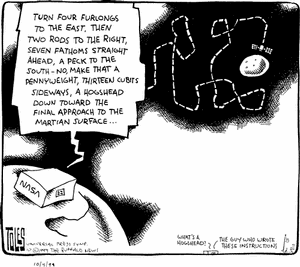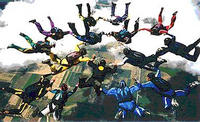| Friday, November 21, 2003 |  |
|
|
|
From the site of the British-American Coalition Against WarMarketing:How do you actively promote starting a war, when most people want peace? How do you convince the peaceful majority of a nation's populace that unprovoked aggression is rational? How can you sell death and destruction, in the name of peace? This is the systematic practice of WarMarketing.
Definition: WarMarketing -- Promoting fear, uncertainty and doubt (FUD), by spin-doctoring known false information with the deliberate intent to justify otherwise irrational acts of aggression. The skillful productization of premeditated acts of mass-violence that is inflicted upon many innocent people, with the ulterior motive to license "officially approved" personal financial gain for a few guilty people.
Definition: WarMarketer -- One who enables a warmonger to package, position and promote the plan to stir up war. One who conceives of and evolves the deceptive re-branding of the government entity previously known as the "War Department," into the more palatable "Department of Defense." Indeed. These days it is vital to become an expert in double-speak, propaganda and Weapons of Mass-Deception, so that you can notice when somebody's fucking with your mind, and take evasive action.
[ Knowledge | 2003-11-21 16:11 | | PermaLink ] More >
|
|
| Wednesday, October 15, 2003 |  |
|
|
|
Some days ago Doc Searls quoted Esther Dyson blogging at Bloggercon:"The first magic of blogging, of course, is that everyone can self-publish. Everyone has a voice. The tools makes that possible.
But the next magic, much harder to achieve, is that everyone wants to be listened to...
[...] In the blogosphere, there's no shortage of airtime, but there's still a shortage of attention." In earlier times, unless you were the village idiot, you'd expect that when you spoke to people, they'd stand still, pay attention, listen, and respond. But in the Internet age you'll have to get used to the fact that there's no guarantee that people will pay attention to you. I've seen quite a few people be shocked when they realized that. "But, but.. what I'm saying is really IMPORTANT. And I'm talking really LOUD." There's just not enough attention to go around. Doesn't mean there's anything wrong with what you're saying, necessarily.
But we do need tools to expand our attention. I.e. be able pay attention to more things without going crazy. If I lift up into the air over the earth, many details will go out of focus, but I'll end up with a beautiful picture of a whole round earth with land and sea and clouds. My picture of the earth becomes more whole and simple by seeing more at the same time. But in our information world, if I try to see more at the same time, I'll just get information overload and go nuts. There's no inherently good reason for that, other than that we're addicted to disjointed information that doesn't fit together when we scale up.
[ Knowledge | 2003-10-15 16:00 | 0 comments | PermaLink ]
|
|
| Friday, June 13, 2003 |  |
|
|
|
 I'm so looking forward to go back on the metric system. The world just fits so much better together when its measures actually make sense and have something to do with each other. In America the measures are arbitrary and have very little to do with each other. How many feet in a mile? How many ounces in a pound? I have no clue. It makes the world kind of disjointed to still use those mideaval measures. I notice how my perception of the measurability of the world has deteriorated while living here. Compared with how beautifully I perceived everything as fitting together when I was in high school. You know ... I'm so looking forward to go back on the metric system. The world just fits so much better together when its measures actually make sense and have something to do with each other. In America the measures are arbitrary and have very little to do with each other. How many feet in a mile? How many ounces in a pound? I have no clue. It makes the world kind of disjointed to still use those mideaval measures. I notice how my perception of the measurability of the world has deteriorated while living here. Compared with how beautifully I perceived everything as fitting together when I was in high school. You know ...An hour is the time it takes for a liter of boiling water to move one kilometer OK, that's a joke, but that kind of thing. Interrelatedness. Here's a history of the metric system in the U.S., or rather the failure of it. There have been attempts of converting to metrics, but they were never enforced, so, together with Burma and Liberia, the U.S. remains in the middle ages in that regard.
[ Knowledge | 2003-06-13 23:59 | | PermaLink ] More >
|
|
| Monday, May 19, 2003 |  |
|
|
|
A few ornery journalists who don't like blogs are complaining that blogs are represented unfairly in Google search results. In other words, anything said in a popular blog is likely to place very high in a search engine search. It is sometimes presented as a sort of conspiracy termed "googlewash". And the old fashioned media companies might be thought to have reason for considering it unfair that little one-person blogs are more authoritative on many subjects than they are. But there's no such conspiracy, and it is quite obvious what those media companies should do to be equally well placed. Doc Searls has an excellent overview on PrintWash.Tim Jarrett summarizes what I said two days ago about why Google search results are often thickened with blogs, and why the situtation could quickly be corrected by full exposure of print journal archives on the Web:In other words, if you choose not to participate on the public, freely linkable, not for pay Web, don¹t complain when others who do participate by the rules of the game are easier to find. Dave agrees:Anyway, Doc Searls, the happy blogger (always!) finds a glass-half-full solution. The print journalists should walk down the hall to their publishers' office and request that they make their archive publicly available so it can be indexed by the search engines. Google is just indexing what's on the Web. If you want to be in Google, you gotta be on the Web. It's pretty simple. Very simple indeed. And very fair and democratic. If you want mind-share on the net, you need to put out a lot of good stuff that people like. It has to be easily available, and it has to be possible to link to it and quote from it. But then again, maybe we shouldn't tell the big corporations about this. I kind of enjoy my splendid google rankings.
[ Knowledge | 2003-05-19 15:42 | | PermaLink ] More >
|
|
|
|
Researchers from University of Chicago suggest that a good way of finding like-minded people is to connect up people who do the same searches in search engines. That shouldn't be too much of a surprise. But it is fairly untapped territory. So how can that be tapped? Hm, unless Google does something with it, I suppose a bunch of people could agree to pass all their searches through an intermediary page, which keeps track of who searches on what, and notifies people when a pattern is forming. Maybe all those people who come to my site looking for "naked ganguro girls" should talk.
[ Knowledge | 2003-05-19 15:19 | | PermaLink ] More >
|
|
| Thursday, May 15, 2003 |  |
|
|
|
From Seb Paquet:A project of PRWatch.org, Disinfopedia was started in last January - almost exactly 2 years after Wikipedia, after which it is modelled. It describes itself as"a collaborative project to produce a directory of public relations firms, think tanks, industry-funded organizations and industry-friendly experts that work to influence public opinion and public policy on behalf of corporations, governments and special interests. We are already working on 1015 articles.
Anyone, including you, can edit any article right now. See the Disinfopedia FAQ for more background information about the project. Read the help page and experiment in the sandbox to learn how you can use and contribute to the Disinfopedia.
The content of Disinfopedia is covered by the GNU Free Documentation License, which means that it is free and will remain so forever. See Disinfopedia:Copyrights for the details and open content and free content for background." This could turn into a highly useful resource for making sense of much of what we read and hear, complementary to things like Who owns what. I'm kind of worried about the possibility of edit wars, though, should that wiki become very popular - is it possible to write neutrally or objectively about such a topic? Wow, marvelous resource. We need more of that. And, yeah, it could be a problem if it becomes too popular and influential. Then the people who are the object of it would be quite likely to start a war against by messing directly with it.
[ Knowledge | 2003-05-15 15:25 | | PermaLink ] More >
|
|
| Saturday, May 3, 2003 |  |
|
|
|
 Some people are having a discussion about whether and how language shapes how we experience the world. Stavros the Wonder Chicken has a very long post examining different academic models, and using Korean as an example. And David Weinberger has an excellent post talking about Heidegger. Some people are having a discussion about whether and how language shapes how we experience the world. Stavros the Wonder Chicken has a very long post examining different academic models, and using Korean as an example. And David Weinberger has an excellent post talking about Heidegger.
I enjoy philosophical discussions, and I particularly enjoy examining how world views are constructed. But I guess I have somewhat limited patience with academics, and I'm not overly educated in traditional philosophy. I tend to be most interested in examining other models to possibly improve on the model I already have, and I have little interest in models that are more limited than my own, even if they are maybe of historical interest.
Anyway, I find it quite obvious that people being native speakers of different languages see the world a bit different. Western languages tend to construct sentences out of subjects and objects. That creates a certain separation between things, which doesn't necessarily exist, but which makes native speakers of for example English often believe that they can say things really precisely in their language. And because the sentences fit together well, and seem to fit with each other, they often end up with the misguided belief that their language provides a complete description of physical phenomena. Which is borderline insane, in my view.
I've noticed how Chinese or Japanese speakers often will make certain consistent mistakes in English. Like mixing up singular and plural. Some people figure it out eventually, but some people never do. For an English speaker it is obvious that noodles is plural, because there are many noodles on a plate. A Chinese person is just as likely to call it "noodle", not because he can't count, but because he's seeing it differently. I suppose focusing on the substance, not on the individual pieces. A Korean person leading a Yoga class might say "Touch your left feet". I only have one left foot, but in Korean thinking it makes sense that he's talking to the group, and there obviously are a whole bunch of left feet there. The English speaker will be very focused on himself individually, whereas a Korean will think more as a group.
From what I understand here, a couple of linguistic researchers, Sapir and Whorf, are major proponents of the idea that language shapes our world. There are various degrees of that. Like whether the language absolutely and inescapably shapes our world view, or whether it just influences it greatly. And others again disagree altogether.
I think many humans, many scientific types in particular, have a great fear of admitting that they live within a certain world view, which isn't just The Way Things Are. Particularly it is difficult to admit that what you perceive around you isn't the real world at all, but only a vague approximation and interpretation of a very narrow band of what is really there. Quantum mechanics should have revealed that, but the realization hasn't yet crept into our way of thinking. In part because we still speak the same way.
I think we should learn general semantics in school. Alfred Korzybski's Science and Sanity is still one of the most important books I've read, even though it is a very difficult read. The map is not the territory. The word is not the thing.
[ Knowledge | 2003-05-03 16:13 | | PermaLink ] More >
|
|
| Saturday, April 26, 2003 |  |
|
|
|
 
Proverbs for Paranoids 3: "If they can get you asking the wrong questions, they don't have to worry about answers."
Thomas Pynchon, Gravity's Rainbow, page 251
[ Knowledge | 2003-04-26 18:26 | | PermaLink ] More >
|
|
| Thursday, April 24, 2003 |  |
|
|
|
 Tomalak mentions Leonardo da Vinci, Disciple of Experience, a brief article by Mark Hurst on Good Experience, about how da Vinci was a man of direct experience, dedicated to perceiving and experiencing things directly, as opposed to just talking about them academically. Tomalak mentions Leonardo da Vinci, Disciple of Experience, a brief article by Mark Hurst on Good Experience, about how da Vinci was a man of direct experience, dedicated to perceiving and experiencing things directly, as opposed to just talking about them academically.The sketches, of course, were beautiful. But what really struck me was the sheer breadth of this one man's talents. da Vinci wrote treatises on physics, anatomy, astronomy, warfare, art, and other topics. Without a formal education, da Vinci never mastered Latin, the language in which academic treatises were written at that time. Some scholars dismissed his work.
da Vinci replied that he was a "disciple of experience": "[They may say] I'm a man without learning, [but] I will cite something far more worthy, quoting experience..." In another essay, da Vinci writes that ...the subjects I am dealing with are to be dealt with by experience rather than by words, and experience is the muse of all who write well. And so, as my muse, I will cite her in every case. 500 years ago, da Vinci understood the power of experience. Academic pedigree is fine, but a direct grasp of experience is essential. Analyzing and learning from direct experience is innately more powerful than hiding behind obscure academic methods. da Vinci "got it." Maybe he was the first.
500 years later, there are still those academics whose frameworks, methods, and terminology talk *about* experience but don't help much in bringing people to an understanding of the experience itself. Remember the Italian scholars who were so concerned with da Vinci's knowledge of Latin (the "method" of the day) that they completely missed (or dismissed) his genius - and didn't help others to see it. Ah, yes, there's no better teacher than direct experience with your own senses. But it isn't always what is most fashionable.
[ Knowledge | 2003-04-24 13:56 | | PermaLink ] More >
|
|
| Monday, April 14, 2003 |  |
|
|
|
I consider what I write here in my weblog to be in the public domain. I.e. anybody can copy it and reproduce it anyway they see fit. Doc Searls mentions that he wants his blog to be in the public domain. See a Public Domain Dedication from Creative Commons. The problem is that it is not as easy as one might think to put one's work into the public domain. It is not just as simple as writing a few words under one's text, or even linking to a declaration like that. CC can take you through some steps that will make it more likely that you actually succeed in putting something into the public domain.
It is pretty silly. In most parts of the world the default choice is not that creative works are shared, but that they're hidden and protected behind legal red tape. So you need to jump through some hoops just to be allowed to give your own work away. I've noticed that with my own writings. It doesn't matter how clearly I write that anybody can copy it and distribute it and use it as much as they feel like. Lots of people still think they need to write and ask for permission to use it. Publishers still send me complicated release forms, just because they want to quote something I wrote.
[ Knowledge | 2003-04-14 21:00 | | PermaLink ] More >
|
|
| Thursday, April 10, 2003 |  |
|
|
|

One of Edward de Bono's numerous contributions to the discipline of creative thinking is the six thinking hats.
The idea is basically that you are aware of what thinking and communication mode you are in - what hat you are wearing. That puts things in perspective, sorts statements in a meaningful way, and makes it less likely that people misunderstand each other. E.g. if you're wearing the black hat, you might be playing devil's advocate, and put attention on things that might not work. If that is clear, and announced up front, it is likely that people will take less offense to the criticism, and it is more likely to be useful. If you announce you're wearing a red hat, irrational emotional outbursts are more acceptable, and don't necessarily have to be analyzed logically. Etc. You can have a meeting using that system. Or you can use it in brainstorming, to categorize different kinds of ideas.
Below is a more detailed explanation:
[ Knowledge | 2003-04-10 13:39 | | PermaLink ] More >
|
|
| Wednesday, April 9, 2003 |  |
|
|
|
 How do we invite democracy to emerge? How does spontaneous cooperation happen? How can humanity self-organize in more useful ways? How can we make our civilization more synergetic? How do we invite democracy to emerge? How does spontaneous cooperation happen? How can humanity self-organize in more useful ways? How can we make our civilization more synergetic?
I am here particularly interested in how we can use our existing or almost existing technologies to arrange our information and our means of communicating in such a manner as to invite these things to happen.
My instinct is that our society could be organized in a drastically different way, from the bottom up, in a way that will allow just about all of us to do productive work that we are happy with, and in a way that is vastly more productive as a whole. If we just knew how.
I believe our information networks could provide some core leverage in getting us there, but they aren't yet. It is kind of like we're almost ready to operate collectively at a much higher level, but we're still communicating with tin cans connected with string, and we all have paper bags over our heads, so we can't do anything very complex together, except for rather clumsily and haphazardly.
[ Knowledge | 2003-04-09 02:34 | | PermaLink ] More >
|
|
| Tuesday, April 8, 2003 |  |
|
|
|
 Sheldon Pacotti writes in Salon about whether or not we're doomed based on the fairly inevitable direction of technology towards much more pervasive ways of keeping an eye on all of us, and scary possibilities for destruction, beyond anything we've seen before. He particularly speaks to the discussion on whether governments should try to stop certain kinds of knowledge from being generally available. Sheldon Pacotti writes in Salon about whether or not we're doomed based on the fairly inevitable direction of technology towards much more pervasive ways of keeping an eye on all of us, and scary possibilities for destruction, beyond anything we've seen before. He particularly speaks to the discussion on whether governments should try to stop certain kinds of knowledge from being generally available."The computer-networked, digital world poses enormous threats to humanity that no government, no matter how totalitarian, can stop. A fully open society is our best chance for survival." Yeah, I agree. There's really no way of stopping it, so we need to expand our collective ability to solve problems, our collective intelligence, at least as fast as the speed that new technologies are developed at. The author talks about various sectors of society where governments might think they ought to hold on to all the knowledge. Like, surveillance. If there are cameras everywhere, do we trust government agencies with deciding what to do with what they see? No, of course not. If there has to be surveillance, the only safe thing is if it easily available to all of us."If we must submit to a surveillance society, I think it is clear that an open network, in which no group, agency, or individual is privileged over any other, would lead to a society with a superior character than one in which the citizens remain separate from and observed by the government. Better for us all to be able to watch one another than for the "authorities" to monopolize this power and leave us with only the fear." He then goes on to talk about technologies like nano-tech or genetic engineering, which quite likely might allow individuals or small groups to produce results that could kill every last one of us on the planet. How do we guard against that? Stop that kind of research? Bill Joy suggested something like that. But, no, that ain't gonna happen. There will always be some groups, military, religious, terrorist, or whatever, who will want to do it anyway. So, the question is what is most secure - share information widely, or try to keep it secret. That's the same argument that applies to computer security. Microsoft advocates to just keep all security problems really quiet and everything will be fine. The Open Source world advocates to put everything out in the open, and thousands or millions of people can all help finding the holes and plugging them. Possibly the same thing applies to other technologies."What happens, in a police bureaucracy, if someone releases a nanotech plague into the environment? If the police can suppress information on the structure of the nanobots, then only a handful of government bureaus and hand-picked researchers may be allowed to work on a cure. Millions could die waiting for the bureaucracy to solve the problem. On the other hand, if the molecular structure of the pest is published worldwide, anyone with the expertise could help design defensive technology." I'd lean in that direction. But then again, would that apply to, for example, nuclear weapons? If we all knew how to make hydrogen bombs, would some of us figure out how to make an antidote against them?
[ Knowledge | 2003-04-08 23:37 | 0 comments | PermaLink ]
|
|
| Saturday, April 5, 2003 |  |
|
|
|
Andrius Kulikauskas called me from Lithuania yesterday and we had a good long discussion about him getting involved in Xpertweb, and just brainstorming on things. We already know each other, but after he talked with Mitch and with Britt, it seems that some expanded collaboration is a good idea.
Andrius is a champion of working openly. He's been inquiring into economies that will support that. He is quite a magnetizing force for people who're working on tools for capturing structured thought. We believe in many of the same things. At the same time he draws on mysteriously different sources, and is quite likely to bring up issues that otherwise wouldn't be touched, and that is a good thing.
Look at some of Andrius's thoughts and ideas concerning Xpertweb.
[ Knowledge | 2003-04-05 22:27 | | PermaLink ] More >
|
|
| Sunday, March 30, 2003 |  |
|
|
|
 Paul Hughes does some excellent thinking about really big questions, like the possible origin of the laws of the universe. Paul Hughes does some excellent thinking about really big questions, like the possible origin of the laws of the universe."I have been engaging in some discussion lately about the begining of the universe, and for the first time (amazingly enough) I pushed the 'Where did it come from' question through as far as it can go. And, not surprisingly, it doesn't go anywhere. No matter how you try to explain the origin of the universe, none of the theories can account for the cause of it. What caused the big bang? Where did 'God' come from? etc.
From this, i concluded that there cannot be a begining. If there was a begining, then something must have caused that begining, and so something was there before the begining.
This doesn't answer anything, but I am yet to see another way around the causality problem (defining something as 'acausal' doesn't solve it, it just dodges it).
Now, linked to this 'where did the universe come from?' problem is, 'Where did the incredible laws, which make our universe a coherent place come from?', which is what I think underlies it all. Once the universe began, it is easy to say 'the laws guided the evolution of everything from there'....but how did the laws come to be? Why are they so perfect?" I wish more people would be able to discuss things like that intelligently. Many will merely, if they even try, end up with some silly circular reasoning or 'just because!' kind of answer. I'm not sure I end up in the exact same place as Paul does - that there are no fundamental laws. But then again, I agree that anything is possible, so maybe we do see it the same way. Either way, this would be a great discussion to spend a few hours on.
As Paul points out, any kind of explanation that is built on ideas such as 'that is how evolution works', or 'it is all random' or 'God created it all' or 'it all follows logically from a Big Bang' - are just sort of starting in the middle and not explaning how that arrangement came about.
The best guard against closed-minded fundamentalism, of the religious or scientific kind, would be to invite more discussions like that. And to invite more of us to be comfortable with the uncertainty you run into when you probe deeply enough into how things work.
[ Knowledge | 2003-03-30 13:54 | | PermaLink ] More >
|
|
| Monday, March 24, 2003 |  |
|
|
|
Another thing I notice while traveling is how dependent I normally am on a certain bandwidth of information. Like, in this weblog, I do sort of write whatever is on my mind on what I come across. However, when I'm home it is based on having browsed through quite a number of different information sources, RSS channels, news sites, e-mails, etc. Sitting by my computer most of the day with a broadband connection makes that easy and natural. But if I'm traveling around and have just a dial-up connection at a hotel for a couple of hours at night, it is a totally different thing. Not possible to get much overview of what is going on in the information world.
There are good things about that, of course. It is great to focus on some 'real' experiences. But I'm also looking for ways of not loosing touch. New kinds of tools. Even if I did have a computer with me at all times, with a wireless broadband connection, I probably wouldn't want to be maneuvering web browsers most of the time, if there is a lot of action in my immediate surroundings. I'd like some tools that are more integrated into life, not requiring you to give them full attention for hours.
One issue is the amount of bandwidth (connection speed and time) available. But another is the interface you have to the information world. If you're driving a car, a menu would be a very bad user interface to anything. If you are walking around, an e-mail program or web browser is not very useful. But I'd still like to be connected with things in other places.
[ Knowledge | 2003-03-24 23:54 | | PermaLink ] More >
|
|
| Sunday, March 16, 2003 |  |
|
|
|
Liz Lawley has a long and excellent post about the difference between introverts and extroverts. It also references an article in The Atlantic about introverts. Particularly Liz has some excellent insights."Another thing that emerged from our conversation was her use of the term self-evident. I mentioned that the person who had first pointed me toward the introvert article had an e-mail address of 'self@evident…', which she loved. But I said that the whole concept of something being 'self-evident' seems to me to very specific to introverts. Where an introvert sees something as obvious based on observed actions, an extrovert is more likely to want to explore it, to triangulate views from multiple sources before forming an opinion. To be valid, for me, an opinion must include input from other sources—I don’t believe any of us can be 'objective' or see a full version of what’s around us, and without asking what others see, I don’t believe I’m getting a full picture.
That's where the conversation got particularly interesting—I told her that I thought the extrovert’s desire to discuss things endlessly was the antithesis to the belief that something is 'self-evident'. She said she’d always assumed that the talk was an announcement of fully formed ideas, not a thought-forming process—that the people talking “already had their ideas, and felt a need to subject us to them.” And I replied that for me, that talk is really the only thought-forming process; the thoughts aren’t solid until they’re expressed, discussed, poked, prodded, etc. Internally, thoughts are amorphous and unformed. When 'exposed to the light' through expression, you can see if they’re solid." So, an introvert thinks things through and speaks when the thought is complete. An extrovert speaks in order to clarify his thoughts. That gives plenty of opportunity for misunderstandings and conflict between introverts and extroverts. An introvert might find it insulting that the extrovert immediately questions and takes apart what he says. And an extrovert might find it puzzling that the introvert appears unwilling to talk things through.
Personally I possess traits of both extrovert and introvert. When doing a myers-briggs type personality test, I usually show as being half of each. I can only stand social interaction for so much time before I need to withdraw and recharge my batteries. I hate calling people on the phone. But I often can't clarify my thoughts without taking things apart, throwing some loose ideas out there, exploring the extremes, and talking it over with others. I enjoy spirited dialogue, and can discuss certain things for hours and hours.
[ Knowledge | 2003-03-16 23:09 | | PermaLink ] More >
|
|
| Friday, March 14, 2003 |  |
|
|
|
 Yesterday I commented favorably on Seb's Towards structured blogging. Euan Semple has a contrasting view: Yesterday I commented favorably on Seb's Towards structured blogging. Euan Semple has a contrasting view:"Hey great - then we can all get a taxonomy for the world and we can all argue about which words are more "right" than others, then one group can be more "right" more of the time and can start to dominate and then we can all rest happy that we all agree.
For me the whole point is that the web is just a bunch of words one can link to. We each imbue those words and the links to them with our own meanings and any collective meaning arises out of lots of people linking to the same words in the same contexts." And now Roland Tanglao says:"I think both views are correct. We need structured and unstructured blogging that we can "just" link to." And, well, I agree with everybody. We need both structure and freedom from structure. What I like about weblogging is exactly that I can just post whatever is on my mind, and I don't have to figure out where it "belongs" or what its proper place is in the taxonomy of all knowledge in the world. I just post it, and the weblogging software keeps a certain minimal structure, which makes it relatively easy to find again, and easy for others to link to. What makes weblogging such a booming phenomenon is exactly that I'm freed from thinking about structure, and I can just concentrate on what to say. And I can freely comment on what others say, without worrying much about whether it fits in or not.
But the other side of the coin is that when I'm looking for something, I'd really prefer if ALL information in existence were neatly organized and categorized and cross indexed in any possible way I can think of desiring. I would LIKE to be able to access all movie reviews in the world, and ask for them to be sorted by the reviewer's age or something, and filtering out people who's views I know I don't share.
So, that's a bit of a puzzle. I don't really want to have to make a lot of finegrained choices when I post. But I'd like them to be available when I search. Earlier I talked about the same problem, and I half-heartedly concluded that I'd prefer if some AI program was following me around, neatly organizing everything that happens to me. I just don't see that happening any time soon, as I'm not sure I believe anybody knows how to do good AI.
The best suggestion I have in the interrim is to come up with a scheme where structure can be added, not just by the author, but by casual readers, and/or by automated programs.
Example: I often post references to books. Ideally those references should be recognizable as book references, even by automatic programs. That could happen if we all agreed on a certain XML tag I would use whenever I mention a book. But that would be a hassle if there were thousands of things we might want to flag that way. Movies, people, places, organization, etc. Most authors wouldn't bother doing that extra step. So, for one thing, if I predominantly linked to amazon.com whenever I mentioned a book, a program could easily figure that out. Or, if there is a way for my readers to add structure. Some people will naturally be obsessed with categorization and structure. If a few hundred people read each of my postings, it is quite likely that at least a couple of them would feel like flagging some of the things I've mentioned, as to what it is and what it relates to.
Right now we have few tools that would allow that. Somebody could submit my posting to some categorized indexes like The Internet Topic Exchange. But we need something more finegrained than that. And we need a mechanism for somehow aggregating the choices of a number of people. Different people's selections might not agree with each other. We need a google type algorithm for ordering different people's structure choices.
Maybe I'm dreaming, but this does seem like a question that we should be able to solve now. How can many people do some structural markup of other people's stuff? Do their webpages and weblogs have to cooperate, or could it be done as a layer on top of everything else? XLink can link to specific words or sections in webpages, I believe. How do we organize structure that we don't necessarily all agree on? Ten people say it's a book, five say it's a movie. Seven people say it is Italian, three people say it is French. Different people invent different hierarchies, and place items in different places in them. How do we add it all up? I don't know, but I think we need to. I don't think the answer is to agree on one top-down taxonomy of everything. It more revolves around how to gather meaning from large masses of diverse structure, created spontaneously by large numbers of people.
[ Knowledge | 2003-03-14 17:39 | | PermaLink ] More >
|
|
| Thursday, March 13, 2003 |  |
|
|
|
 Sébastien Paquet has a great article with thoughts about how we can move towards structured blogging. You know, where the meaning of what we post is captured more systematically than just being a bunch of words one can link to. Sébastien Paquet has a great article with thoughts about how we can move towards structured blogging. You know, where the meaning of what we post is captured more systematically than just being a bunch of words one can link to."Lately I've been thinking about how we could evolve blogging tools to allow people to author more structured (dare I say semantic?) content, so that other people could find their stuff that they find of interest more easily.
Right now what we have, globally speaking, is pretty much a huge pool of blog posts, each implicitly tied to a particular weblog author and with a date slapped on. Now, say I've written a review of the latest Radiohead album into my blog. I'd like others who are interested in Radiohead, or in music reviews in general, and who may not know me, to be able to pick out my review from the common pool in a simple way. Interesting people may come my way because of this.
What we're talking about is getting people to put more metadata on their content. Now allowing it is one thing, and fostering it is another. And I'd say the latter is the bigger challenge. Here are some ideas.
...continued in Towards Structured Blogging" Good stuff. Seb suggests some ways of choosing what types of thing you're posting in your weblog entry. Like, is it a 'Music Review' for example. That would allow services a step beyond Internet Topic Exchange aggregating postings more intelligently. I think we need something a couple of steps beyond that, but I can't quite articulate what exactly that is, so this would be an easy place to start.
[ Knowledge | 2003-03-13 23:42 | | PermaLink ] More >
|
|
| Tuesday, March 11, 2003 |  |
|
|
|
Interview with John Perry Barlow, cyber-rights activist, about the dangerous attempts of introducting Digital Rights Management. DRM is a euphemism for letting big corporations control everything about how you use media, even on your own computer, VCR, phone or whatever. It is being spearheaded by Microsoft, Intel, and the big media companies. Barlow speaks more intelligently and eloquently about these things than anybody I know. It is something that affects everybody, and isn't just a techie thing you don't have to pay attention to if you aren't a techie."There are three things at stake. The first is, extending a monopoly to a few large organizations about what people can or cannot know and express. This is really about the control of information and it has the potential to become over time a kind of private totalitarianism. That is not an exaggeration since it has already happened in the United States. The reason that the U.S. is behaving in the completely irrational and dangerous way that it is, is because we have erected private totalitarianism and are suffering a reality distortion field that is as dangerous as the one erupted in Germany in the 1930s. But not being driven by the government, but being driven by the media. Being driven by ourselves. I fear erecting a system which highly advantages a very few corporate channels for human intellectual exchange.
Secondly, I fear that Digital Rights Management today is Political Rights Management tomorrow. That embedding these kinds of technological controls into the very architecture of computing has the capacity to become a form of political control in the not so distant future. Because you're putting at a very basic level surveillance capacity, control over what information may or may not travel, and a whole range of things in the architecture that can be very easily used to suppress dissent.
Third, I am very afraid, that by wrapping a large amount of human knowledge up into bottles that can no longer be opened except at a price, much of it will be wrapped up in crypto bottles that in a very fairly short time cannot be opened even at a price. A huge amount of human creativity will simply be lost for future generations." Go and support the Electronic Frontier Foundation, the most effecive organization working against this stuff.
[ Knowledge | 2003-03-11 23:59 | | PermaLink ] More >
|
|
<< Newer stories Page: 1 2 3 4 5 6 7 Older stories >> |

